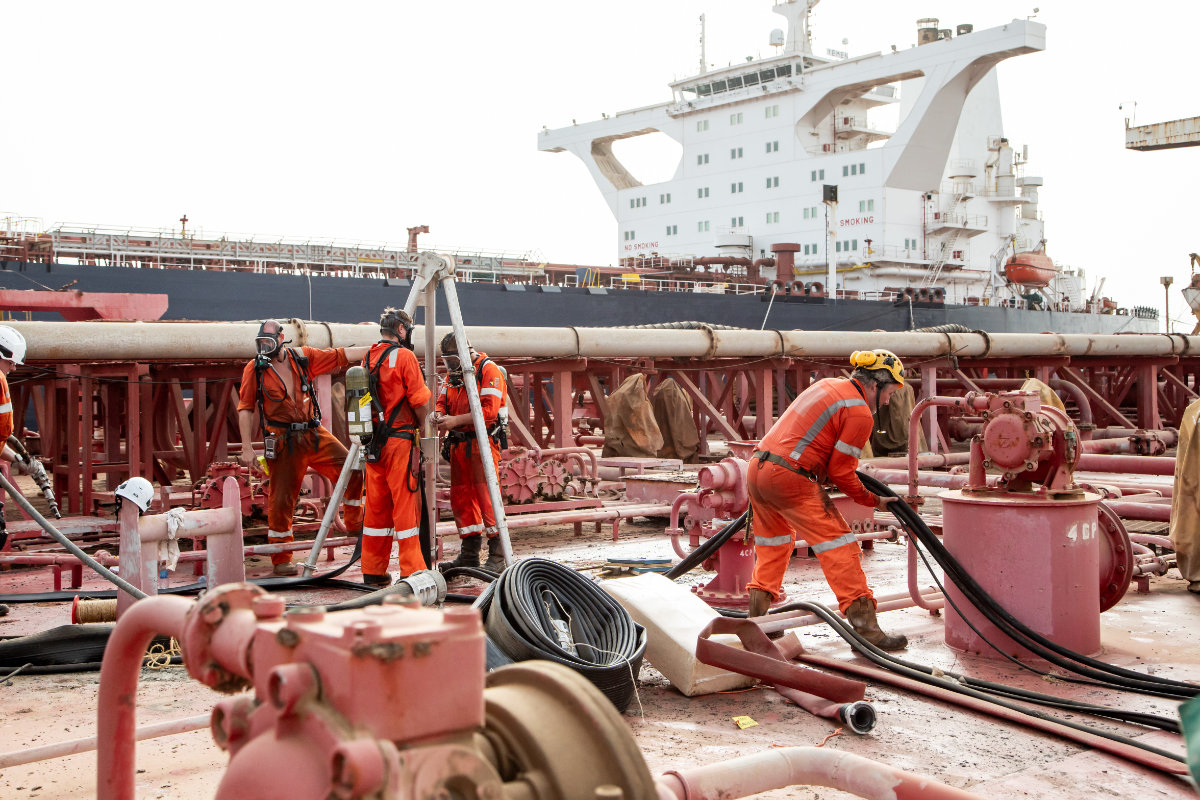The initial stage of the operation triumphs in extracting a majority of the 1.14 million barrels of crude oil stored within the Safer.
Qatar has welcomed news of the completion of unloading operations from a tanker carrying some 1.14 million barrels of oil off the coast of Yemen, in a move that has now curbed one of the world’s worst expected oil spills in the Red Sea.
On Friday, the United Nations declared the successful execution of the operation to remove crude oil from the FSO Safer vessel located off the coast of conflict-ridden Yemen, “avoiding what could have been a monumental environmental and humanitarian catastrophe,” the UN said.
In a statement responding to the news, Qatar’s Ministry of Foreign Affairs restated Doha’s gratitude for the collaborative endeavours of the UN and global partners in confronting the critical ecological concern.
“The State of Qatar welcomes the United Nations’ announcement of the completion of
the plan to empty crude oil from the decaying Safer Tanker in the Red Sea off the coast
of Yemen,” the statement read.
“The Ministry of Foreign Affairs renews Qatar’s appreciation for the efforts of the
United Nations and international partners in addressing one of the most pressing environmental issues by preventing oil spill from the tanker into the Red Sea,” it added.
The statement confirmed “Qatar’s pride in contributing to the United Nations coordinated rescue operations to prevent the catastrophic oil spill” and said it is prepared to support all international efforts aimed at building a safer and more sustainable future for all.
For over three decades, the FSO Safer has been anchored approximately 4.8 nautical miles southwest of Yemen’s west coast, near the Ras Issa peninsula. The Houthi rebels control the area where the tanker is anchored and the national oil company that owns it had inked a pact with the UN in early March 2022 to deal with the issue.
In 2015, the tanker’s production and maintenance ceased because of the eight-year-long conflict involving a pro-government Saudi-led coalition and the rebels. As a consequence, the vessel has now deteriorated beyond repair.
In May 2022, Qatar pledged $2 million to combat the threat posed by the ship which has been described by the UN as a “ticking time bomb.”
The UN managed to fundraise a total of $115 million to support the initiative to avert the spillage from various donors including private companies, members of the public and governments around the world.
However, the UN warned it needs another $28 million to complete the project, it said in a statement on Friday.
The UN chief cautioned that the expenses for the cleanup process alone would amount to $20 billion and voiced concerns that shipping routes, including the Suez Canal, could face disruptions lasting for several weeks.
While the years-long conflict in Yemen had previously halted the production, offloading, and maintenance activities of the tanker, the UN had engaged in negotiations with the country’s conflicting parties to reach an agreement and establish a framework for the retrieval of the oil from the tanker.
The pumping operations were being conducted by salvage company, SMIT, and included numerous other parties, such as maritime oil spill experts, maritime lawyers, insurance brokers, and shipbrokers.
To mitigate the risk of explosion, a chemist was continuously monitoring the gas levels in the pumped tanks.
Two-stage strategy
After a two-year period dedicated to fundraising efforts, a UN rescue team initiated the first part of a two-fold strategy by transferring oil from the FSO Safer to a substitute vessel on 25 July.
Most of the 1.14 million barrels of oil trapped on the FSO Safer have been extracted to an extent. However, less than 2% of the original oil remains mixed within sediment that will be eliminated during the final cleansing phase.
The subsequent step of the operation involves implementing a mooring system to enable the replacement vessel, named The Yemen, to remain stationary. The ultimate plan for the FSO Safer involves towing it to a shipyard for dismantling.
The completion of the entire operation carries a total expense exceeding $140 million, with approximately $20 million still required to achieve this, UN’s secretary-general said.
Eyes on the oil already
Separately, interest in the oil has already sparked discussions.
According to the UN Resident and Humanitarian Coordinator for Yemen, David Gressly, the now-transferred crude oil is in a favourable state, suggesting its potential for sale. However, such a move will necessitate discussions between the conflicting factions in Yemen, he added.
He mentioned that the United Nations has put forth the option of acting as an intermediary, which may involve establishing a trust fund or an escrow account, although definitive choices have not been finalised as of now.
“In fact, one of the reasons we opted for this particular solution was because of the complexity either of both getting the parties to agree to the sale of the oil, but also to not have to confront the legal ownership issues because the oil is actually owned by multiple parties,” he said.
“So, rather than taking months or even years to resolve that problem, during which time the Safer could have sunk, we opted to get the oil off first by the time required to find a solution to the sale of the oil.”







